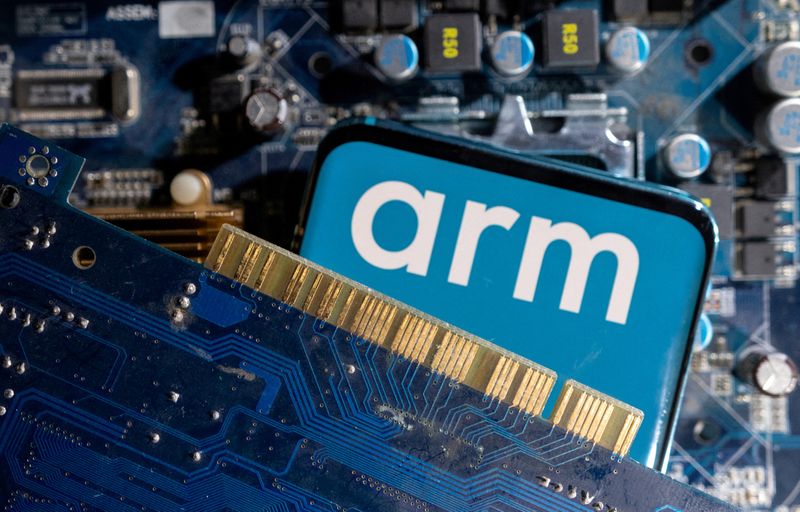Analysis-For retail investors, jumping on Arm’s blockbuster IPO is a risky business
2023.09.11 21:01

© Reuters. A smartphone with a displayed Arm Ltd logo is placed on a computer motherboard in this illustration taken March 6, 2023. REUTERS/Dado Ruvic/Illustration/File photo
By Noel Randewich and Hannah Lang
(Reuters) -Retail traders getting their first bite at Arm Holdings’ highly anticipated public offering when the British chip designer begins trading this week should beware: individual investors often get burned when they jump on hot listings.
Arm’s goal of raising around $5 billion in New York in what might be the biggest IPO of 2023 follows other major listings in recent years whose returns have mostly disappointed.
Since Arm, owned by Japan’s SoftBank (TYO:) Group’s, is not well-known among consumers, it is focusing its IPO marketing efforts on institutional investors, people familiar with the deal said.
That leaves most Main Street investors to buy Arm shares at potentially higher prices once they begin trading. With retail investors holding individual stocks for less than a year on average, recent history suggests they could lose money, a Reuters analysis shows.
The 10 biggest U.S. initial public offerings (IPOs) of the past four years are down an average of 47% from the closing price on their first day of trading, according to the analysis of LSEG data as of Friday. Investors who bought at the top of an intra-day price surge that often occurs in high-profile listings would have fared even worse, with an average loss of 53%.
Only two of the stocks in those top 10 are up from their IPO prices: software seller Snowflake (NYSE:) and Airbnb, which leads with a 111% return.
While dabbling in individual stocks is a notoriously risky business for amateur investors, the analysis underscores just how perilous it can be to buy into blockbuster IPOs on Day One.
Even institutional investors invited to buy into those 10 IPOs before trading would be down an average of 18%.
The has gained an average of 13% since each of those IPOs, nine of which happened in 2020 and 2021.
“If you’re buying in the market, on average, you’re buying at a premium to the offer price,” said Jay Ritter, a professor at the University of Florida who studies IPOs. “For almost all retail investors, buying and holding a low-cost index fund is the best strategy.”
Arm’s debut and an upcoming listing from grocery delivery service Instacart are expected to rejuvenate a lackluster IPO market which has slowed over the past two years due to volatility and economic uncertainty.
Instacart will be offering some retail investors a chance to buy into its IPO via underwriter fintech company SoFi (NASDAQ:), its prospectus said. On Monday, SoFi notified customers it would be offering a “limited number of shares” in the Arm IPO too.
While Arm is a business-to-business company with little consumer brand recognition, its IPO publicity is likely to attract retail interest, said analysts. Nvidia (NASDAQ:), the chipmaker at the center of an artificial intelligence boom, has been a retail favorite this year.
Retail participation in U.S. stocks surged in 2021, fueled by low interest rates, zero-cost trading apps, and social media hype around GameStop (NYSE:) and other so-called meme stocks.
But Main Street investors have become more cautious after last year’s stock market sell-off, said Marco Iachini, a senior vice president at Vanda (NASDAQ:) Research, which tracks retail trades.
“Whatever comes out of the Arm IPO, you’ll see niches of the retail community trying to get in on it, but it’s not going to be at the levels we saw in some of the IPOs in 2021,” he said.
Spokespeople for Arm and SoFi declined to comment. Spokespeople for Instacart and the 10 companies whose IPOs were analyzed did not provide comment, or did not respond to comment requests.
CRUSHED VALUATIONS
Arm is seeking up to $51 per share, potentially valuing it at more than $50 billion – the most valuable company to list in New York since electric carmaker Rivian (NASDAQ:) Automotive debuted in 2021.
Burning through cash to ramp up production, Rivian’s market value has collapsed by over $60 billion since it listed. Also among the biggest IPOs in recent years, food delivery company DoorDash’s stock remains down by more than half from its intraday high on its December 2020 debut.
To be sure, it has been a tough few years for IPOs. Wall Street’s steep sell-off in 2022, along with rising interest rates and fears of a potential U.S. recession, have crushed valuations of companies that went public before they were profitable. But studies by Ritter and others have shown IPOs offer poor returns.
In the past four years, over 260 IPOs have debuted with stock market values above $1 billion, mostly in the technology, healthcare and consumer discretionary sectors, according to LSEG. They are down on average 29% from their offering prices and down 49% from their initial trading highs.
One standout among recent big IPOs is chipmaker GlobalFoundries, which has gained 23% since its 2021 listing, compared to the S&P 500’s 3% dip over that time.








